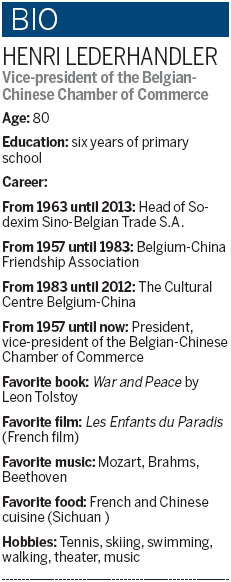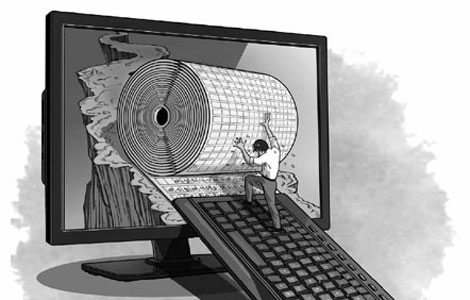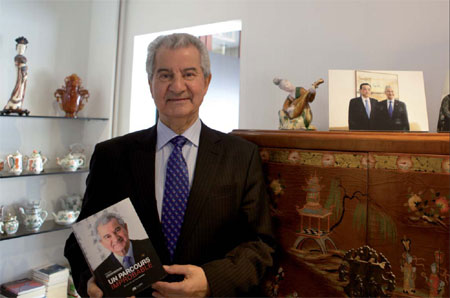Keen satisfaction in improbable life
Updated: 2013-10-11 09:56
By Fu Jing (China Daily)
|
|||||||||||
Pioneer of sino-belgian relations has witnessed the incredible changes to his second Motherland
Retirement has given 80-year-old entrepreneur Henri Lederhandler a new lease of life and a new avenue for developing Sino-Belgian relations.
When he stepped down as head of an agency exporting steel, chemicals and heavy machinery to China, he began writing his own story, involving more than half a century of trade and cultural relations with China.
Now he is busier than ever in responding to public interest in the resulting book.
"In the coming month, I will give six lectures in Brussels, all about my book," says Lederhandler, who is also vice-president of the Belgian-Chinese Chamber of Commerce.
Un Parcours Improbable (An Improbable Journey), published earlier this year, covers meetings with Mao Zedong and Zhou Enlai in the 1950s and 60s, to those with present-day leaders. Such is Lederhandler's standing in China that in May last year, the now premier, Li Keqiang, visited his home and family in Brussels to thank him for his pioneering contribution to bilateral trade and economic relations.
He finished the book with French language professor and China expert Serge Pairoux. The Chinese version of the biography will be published this month.
"I only had six years of education and I am not good at French literature," the self-made businessman says, sitting in the sofa of his spacious and Chinese-decorated living room, and much happier talking rather than writing.
"At the upcoming lectures, I will speak about my life, which is the beginning of the book, and then I will come back to the stories with China." he says. "The main part of the book is about my experiences with China, within its business and political circles."

Bernard Dewit, chairman of the Belgian-Chinese Chamber of Commerce, says Lederhandler's book is a message of hope for people of humble origins who wish to succeed.
"Lederhandler's life has been, for a great part, dedicated to the improvement of business and political relations between China and the Western world," Dewit says. "We have to listen to his voice at a time when some groups are advocating a closing of the borders."
The twists of fate at the beginning of his life's journey are as improbable as those leading to China.
Lederhandler was born in 1933, one of four children of a Jewish Polish family who had moved to Brussels 12 years earlier. His father, a miner, died in a concentration camp, but thanks to a Belgian woman, who hid Jewish children from the Nazis in a remote area near the French border, he and his brother escaped the Holocaust.
Following the war, aged 14, he worked for a leather company before joining the army for two years.
Lederhandler then joined the Belgium Young Communist League, becoming responsible for international liaison, where he developed close bonds with Wu Xueqian, who was in charge of China's Youth League and later foreign minister and vice-premier of China.
"Wu was my first Chinese friend," Lederhandler says of the man who first invited him to visit China in 1957 as part of a 10-member political delegation. That was when he met then premier Zhou Enlai.
In 1963, Lederhandler started an import-export business with China and, the same year met Chairman Mao.
In all that has happened and changed in China over the past 50 years, the Belgian has remained close to its leaders, people and events, having visited his "second motherland" more than 70 times.
In his book, he tells why China could only start to reform and open up in 1978, which he describes as "an earthquake", transforming the country's economic and social landscape. That was the year China and the United States made huge progress in bilateral relations.
"From my point of view, the recognition of the People's Republic of China by the US was a very important element, explaining why Deng Xiaoping could start this new policy.
"Domestically, China put an end to the chaos of 'the cultural revolution' (1966-76) and, externally, ties with the US improved. But it didn't happen overnight. It was a gradual process.
"Thirty years in terms of history is not long, but China has made unbelievable progress."
Most impressive, says the Marxist-Darwinist Lederhandler, is the lifting of 400 to 500 million out of poverty.
However, he claims such progress is still not well reflected in the Western media.
"Until recently, the Western media hasn't given objective coverage about what happens in China. Some of them only say bad things and cover problems of this fast evolving country, which is a pity."
Lederhandler says this biased reporting is one of the main reasons why he remains active in giving Westerners a proper picture of China.
"As a long-time witness of China's development, I have a huge responsibility to do so," he says.
But Lederhandler, who helped found the Belgium-China Friendship Association in 1957, says he must also acknowledge mistakes China has made in its development.
"I must do this; like mentioning good things and bad things, yin and yang. If I don't, I am not honest."
He is concerned about the gap in regional development across the country today. While China's eastern and coastal regions have experienced fast growth and industrialization, he says, "I think the development in China's western regions is too slow."
Corruption is a "daunting" challenge too, he says, but he is relieved that the country's new leadership is making greater efforts to tackle it.
Pollution is also a major issue. "I can understand that China has made great efforts, but it is still a big problem."
As a former young Communist, Lederhandler says he still holds strong belief in socialism. "China's success is for me a kind of realization of what I believed when I was young."
China, he says, is a socialist country that has adapted Marxism well to today's conditions while learning from the failures of the Soviet Union and Eastern Europe. "We are not in the time when Karl Marx wrote The Communist Manifesto; we are now in 2013."
Finally, Lederhandler says his book also commemorates the Chinese he started to deal with in the 1950s.
"I am 80 this year and so many of my old Chinese friends have passed away. This is my way to remember our lasting friendship."
Li Xiaofei contributed to the story.
fujing@chinadaily.com.cn
|
Henri Lederhandler says the publication of his book is a way to commemorate his old Chinese friends. Li xiaofei / for China Daily |
(China Daily European Weekly 10/11/2013 page32)
Today's Top News
Senate leader 'confident' fiscal crisis can be averted
Riding the wave of buy-ups
Working group to discuss sea issues
Chinese firm joins UK airport enterprise
Disaster response gets a helping hand
Have yuan, will travel far and wide
Draft regulation raises fines for polluters
Communities give care for elderly
Hot Topics
Lunar probe , China growth forecasts, Emission rules get tougher, China seen through 'colored lens', International board,
Editor's Picks

|

|

|

|

|

|






